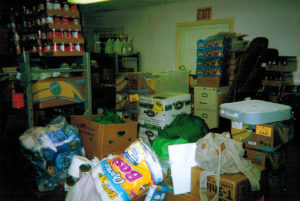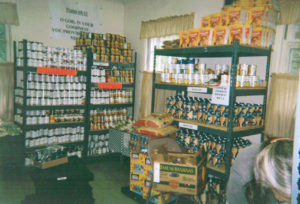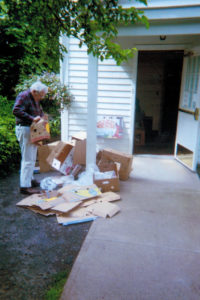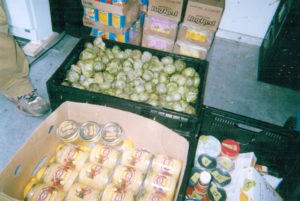New Beginnings – Part 2 as I Explore the Spirituality of Hunger in America


Like many first-time pantry volunteers everywhere, I showed up that morning because someone from the church asked me to come. A slot needed to be filled and I stepped up to the plate when I was asked. I was a foot soldier in the army of the outreach. I tried to live up to my status in the church as a new member. I showed up at whatever activity needed help and did my share. Nothing more.
I had no desire to move up any ladder in the congregation.
On that morning of new beginnings, I had no premonition I would ever return to this pantry room.
I had no plans for this place in my future. I had a profession teaching reflexology, Reiki, and canine massage therapy in a healing space in my home on Tannery Brook.
This was a case of fools rushing. Knowing what I know now, I should have run out the door and never looked back. Mary could have handled the crowd that day without me. In the whole two hours, no more than a couple dozen people visited the pantry.
I wasn’t blessed with any psychic knowledge…certainly not the feeling of danger I felt when I saw the head of the building committee in the hallway outside the pantry months later.
There were no lines in the hallway at the new beginnings of my time there. People wandered into the pantry in groups of one and two to choose from cereal, soup, tuna, and peanut butter.
Never in my wildest thoughts on that day did I envision the pantry hallway filled with hungry people, the tiny room packed with fresh produce and jammed with shoppers.
By 2008, the tanked economy was well underway and waits in the hallway were an hour or more.
The Hunger Prevention Nutrition Assistance Program (HPNAP) passed down feeding guidelines which included whole-grain bread, 1% milk, fresh produce. By 2011, the building committee had rules dictating where people could stand, what bathroom they could use, and what parts of the hallway were off-bounds.
Never did I foresee monthly food deliveries averaging over 12,000 pounds.
Never did I imagine, on that day, building committee members angry over hungry people receiving food according to guidelines set down by the State of New York, the Department of Health, and the United States Department of Agriculture.
I never thought I would spend months grappling with the unworthy hungry, a concept introduced to me by a local religious leader. The concept wasn’t explained. Only the two words – unworthy hungry – were used in a sentence: “You are feeding the unworthy hungry.” This was something I never heard of before. What did she mean? Who were the unworthy hungry?
After that first morning in the food pantry, I drove home, pulled out a little notebook from a drawer and wrote what people said, like real writers do. When I wrote these things down, I felt my grandmother’s presence.
Her spirit was with me in the room. I looked around the dining area to see if someone had entered the room without my realizing it. But, no, I didn’t find a soul. I walked over to a cabinet and began my dialogue journal on that afternoon.
A shopper: “They cut my food stamps again. I don’t know how I’m going to make it. I have no money this month. My car died and I don’t know where I’m going to get money to fix it. If I can’t fix it, I can’t buy a new one either.”
Lillie Dale Cox Thurman spoke to me clearly that morning with emphatic, strong, direct instructions. She went straight to my head: “Write this down! Write this down too! Now…write this down.”
My grandmother, Lillie Dale Cox Thurman, stepped into my life on the first morning in the food pantry and never left. Not even when my mother, Uralee Thurman Lawrence, roared in with prayers and fast, furious, aggressive instructions which I resisted to the bitter end. Under their directions, I joined the crowd in the basement and was soon volunteering regularly.
So, now, I’ve got the second volume, “The Ketchup Sandwich Chronicles,” coming out on this blog.

Thank you for reading this blogged book! Please refer it to your preferred social media network and stay tuned for future chapters!
Thurman Greco

Exploring the Spirituality of Hunger in America – New Beginnings Part 1

Part 1
I began this memoir before I even knew it. On the first day I worked in the basement food pantry, I sat with Mary, a member of St. Gregory’s Episcopal Church and the head of the alter society. We greeted a couple dozen hungry people. Mostly single homeless men, there were a few of Woodstock’s famous colorful characters included in the mix that day.
Throughout my career in the pantry, the most colorful of the colorful was Grandpa Woodstock who liked to bring his bride, Lady Estar into the pantry to shop. The two of them went around the room choosing from peanut butter, cereal, tuna fish, and soup. While this happened, he entertained us gushing enthusiastically.
“My, how beautiful you look today!” I fell for his spiel every pantry day. Those words melted my heart. The most professional of the street actors, he knew how to make us each feel special when he flashed his peace sign and posed for photographs. Grandpa knew how to flash that peace sign, whip out his postcards to sell, and sound off his horn “toot toot”. I sometimes thought he spent a few afternoons posing in front of a mirror to figure out how to get the best response from tourists.
Grandpa Woodstock and Lady Estar were most photogenic with their long, flowing silver hair. Their lovely matching beards only emphasized floral print silk skirts and kimonos. Their toenails were painted matching colors and their Teva sandals matched.
None of Woodstock’s rich and famous got so many requests for autographs and photographs. They simply couldn’t compete with his show off tricks.
After all, Grandpa entertained us all with street theater at its finest. So what if he didn’t mean a word of it? We all enjoyed being sucked into the show!

 Thank you for reading this article. Please refer it to your preferred social media network.
Thank you for reading this article. Please refer it to your preferred social media network.
Thurman Greco

Hunger: An Introduction
The first time I ever saw a child begging for food was in Mexico. I was on a car trip going through Monterrey on the way to visit my future in-laws in Mexico City. When we parked the car in front of a restaurant, children immediately surrounded the vehicle. Small children held their hands out, asking for money for food. Each held up little brown palms. Their pleading faces looked into my eyes.
At that time, I didn’t yet speak any Spanish, but I didn’t need a vocabulary beyond English to understand the situation. Their body language spoke of expectations, hope and hunger.
“Don’t worry yourself about this Coit. They’re just after a few pesos.” My soon-to-be husband tried to comfort me. In my heart I knew different. The child we discussed was about the size of a thin eight-year-old. Teeth don’t lie though. He had a mouth full of adult teeth. That put his age at about twelve years.
In Mexico, children dig through trash for food. And, nine years after this road trip, in Mexico City, a beautiful young Indian woman standing on a corner tried to sell her infant. She approached my church friends first, an American couple in Mexico City on a study visa. Bob and Sue felt they couldn’t get the baby over the border when they returned to the U.S. at the end of their class. I wasn’t a good candidate because, at the time we discussed the baby, I was still married, had no visa or citizenship papers, and didn’t feel I was ever going to cross back over the river heading North.
Whatever happened to that beautiful baby? Whatever happened to her desperate mother? I’ll never know.
You want to talk hunger, then let’s discuss Venezuela and Mexico for a while. Even now, years later, I remember each encounter with a hungry person or household as if it happened only yesterday. I’ll never forget those people, the look of hunger in their eyes.
When people wanted to talk to me about hunger in America, it was a nonissue. Hunger in America? Whoever heard of such a thing?
Hunger has been with us in this country since the beginning. Famous American history stories include Pilgrims starving over the first winter in their new home. The stories of Mormons starving when they headed west are just two. These stories are different from segments of our population going to bed hungry because there isn’t enough money for food.
Even though I’m the loudest mouth in the crowd when I talk about hungry people in America, I’ve never seen hungry children begging for food when I park my car outside a store or restaurant.
Somehow, in this country, hungry people keep themselves hidden unless they are in the food pantry or soup kitchen line.
I lived in both of those places. I could talk hunger with you “until the cows come home,” as my grandmother said. But America? “Fuggedaboutit,” as I heard someone say once on a Brooklyn bus tour.

Thank you for reading this blog post. It is an excerpt from “The Ketchup Sandwich Chronicles”. I’ll be posting more stories from this book in the coming days.
I hope you enjoy them. If so, please refer the posts to your favorite social media network.
But, whether you refer them or not, I thank you for reading this story.
Thurman Greco


Writing this Blog Post was Risky

Writing this blog post was risky. In the early days I worried about peoples’ opinions. I wrote my first blog entries with skeptics in mind. On some level it was important to me for pantry deniers to understand that there are, indeed, hungry people around us
One day I saw clearly that some people aren’t going to like me or my work. Nor are they going to believe what I write, no matter what I say. Once I realized that truth, I knew I’d been wasting energy on other people’s opinions.
I’m no longer interested in convincing anyone about what it means to go to bed hungry.
I’m okay with people saying anything about me because I know the chapters I write are true. The words I write make a difference in peoples’ lives.
This blog is about people creating better lives for themselves while not having enough to eat and lacking proper healthcare, housing.
This blog is about healing and creating new opportunities in one’s life. This blog is about people changing their lives – against all odds.
While I tell this story, I know some people won’t believe a word. It’s okay. I have my story and they have their story.
Food and sex and money are three words and issues more concerned with a person’s core beliefs, emotions, and spiritual attitudes than anything else.
These three words offer rules for everyone. We each have core beliefs around them with opinions about what is okay and what isn’t okay. We have attitudes about food, sex, and money based on what we were taught by family members and peers when we were children. We live our lives based on those experiences. Reduced to their lowest common denominator, these words – food, sex, and money – are the same. They touch core beliefs in ways going straight to the heart and soul.
The food pantry was all about food and money. The sex part was limited, but still there. Sex happened in the pantry hallway line when a shopper suffering with mental illness, a handsome young man who lived in another world, masturbated in the food line.
Our attitudes, opinions, feelings about feeding hungry people are or are not based on facts, statistics, or reality. Nor will facts, statistics, information, change attitudes.
Finally, we all have beliefs about who it’s okay to feed and who it’s not okay to feed. My beliefs are based on life experiences, facts, statistics. Their beliefs are based on the same. I may have taken classes, gone to therapy. And, they may have also.
Their reality about what is okay and my reality about what is okay differ.
In the food pantry hallway, we all looked at the same people and saw different things. This situation is proof positive we each create our own reality about hungry people. Nothing changes either reality. We each see hungry people through lenses shaped by separate life experiences. Hungry people don’t live in two realities.
As the lines got longer, we looked at people in the line. I saw hungry people and they didn’t. I interacted with people weekly who dumpster-dived to feed themselves as well as their children, parents, housemates. Occasionally I read articles about the ethics of dumpster diving. I didn’t think we could explore the ethics of allowing people go hungry because they couldn’t make enough money at their jobs to buy the food they needed to live and work.
People coming to a food pantry can take a three-day-supply of food home each week. The other four days, they’re on their own. That means they can buy more food if they have a SNAP card and if they can get to a store selling food. If they don’t have the money or a SNAP card, they get creative or go hungry. This involves panhandleing, borrowing money or food from friends, relatives, neighbors. They can steal, dumpster-dive, drop in at someone’s house at mealtime, and skip meals.
“Thurman is out of control over at the food pantry” described the local vicar because of the number of people shopping at the pantry and the amount of food they took home.
Thank you for reading this blog post. Please refer it to your favorite social media network.
Thurman Greco







